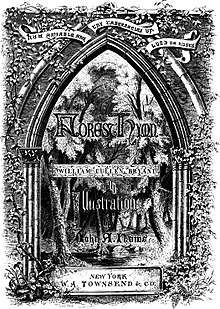A Forest Hymn
"A Forest Hymn" is an 1824 poem written by William Cullen Bryant,[1] which has been called one of Bryant's best poems,[2] and "one of the best nature poems of that age".[3] It was first published in Boston in the United States Literary Gazette along with several other poems written by Bryant.[4]

Analysis and reception
Said to have been only conceivable by someone familiar with the "thick foliage and tall trunks of [the] primeval forests" in Massachusetts,[5] "A Forest Hymn" is said to have been Bryant's way of saying farewell to country life before moving to New York City in 1825,[6] which came about during a period where he wrote a large number of works.[7] It is reflective of Bryant's love of nature and religious belief,[8] has been called a "picturesque poem", and Richard Henry Stoddard has said:
The gravity, the dignity, the solemnity of natural devotion, were never before stated so accurately and with such significance. We stand in thought in the heart of a great forest, under its broad roof of boughs, awed by the sacred influences of the place. A gloom which is not painful settles upon us; we are surrounded by mystery and unseen energy. The shadows are full of worshippers and beautiful things that live in their misty twilights.[1]
At the pace of the wind "playing upon the leaves and the branches of the ancient woods,[9] Eleanor O'Grady has suggested that the poem be read in a smooth and gliding manner, as done in Median Stress.[10]
The poem has been published many times, including an 1860 edition with illustrations by John A. Hows.[11]
John Muir's first article advocating forest protection, a February 5, 1876, editorial in the Sacramento Daily Record-Union, alludes to Bryant's first line in its title: "God's First Temples: How Shall We Preserve Our Forests".[12]
References
- Symington, p. 83.
- Lamberton, et al., p. 102.
- Silverman, et al., p. 120.
- Royse, p. 61.
- The Methodist, p. 49.
- Blount, p. 113.
- Stoddard.
- Jones, p. 271.
- The Methodist, p. 50.
- O'Grady, p. 30.
- Bryant, p. 1.
- Eric Rutkow, American Canopy: Trees, Forests, and the Making of a Nation, Scribner 2012, p149
Sources
- Blount, Alma (1914). Intensive studies in American literature. Macmillan. OCLC 2082749.
- Bryant, William Cullen (1860). A Forest Hymn


- Jones, Lewis Henry (1904). Jones readers by grades. 8. Ginn & Company. OCLC 4105987.
- Lamberton, John Porter (1908). The Masterpieces and the history of literature: analysis, criticism, character and incident. Hamilton Book Co. OCLC 12648626.
- The Methodist Review. 11, 19, 41. The Methodist book concern. 1859. OCLC 1757206.
- O'Grady, Eleanor (1890). Aids to correct and effective elocution: with selected readings and recitations for practice. Benziger Brothers. OCLC 37011706.
- Royse, Noble Kibby (1871). A manual of American literature: designed for the use of schools of advanced grades. Cowperthwait and Company. OCLC 5691582.
- Silverman, Kenneth (1971). Literature in America: A century of expansion. 2. Free Press. OCLC 127649.
- Stoddard, Richard Henry (1900). "Bryant, William Cullen


- Symington, Andrew James (1880). William Cullen Bryant: a biographical sketch: with selections from his poems and other writings. Harper & Brothers. OCLC 10645450.
External links
| Wikisource has original text related to this article: |
| Wikimedia Commons has media related to A Forest Hymn. |
- An outline of the poem: pages 113 to 117 in Intensive studies in American literature at Google Books.